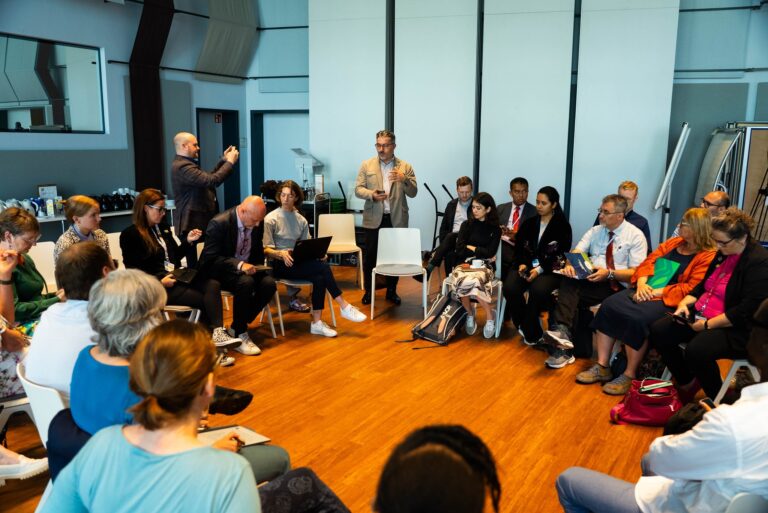A new chapter for climate federalism in Brazil: Lessons and legacy from the LGMA National Coordination Group for COP30
How Brazil’s pioneering multilevel coordination effort is reshaping multilevel governance and collaboration at home and inspiring global pathways.
On 18 November, at the Cities & Regions Hub in Belém, representatives from the LGMA National Coordination Group in Brazil, convened to reflect and celebrate the first year of this collective effort aiming to amplify the role of Brazil’s local and regional governments in shaping the country’s position and participation at COP30, advancing the principles of climate federalism and multilevel governance.
Launched on 28 March 2025, representatives from national ministries, state and municipal governments, international organizations, and civil society gathered in the Chamber of Deputies in Brasília for the kickoff of the Coordination. Co-convened by ICLEI – Local Governments for Sustainability (ICLEI), which serves as the focal point for the Local Governments and Municipal Authorities (LGMA) Constituency and partners, this new structure was conceived as a space where subnational governments and national leadership could meet on equal terms, coordinate their messages, and jointly shape Brazil’s contribution to COP30.
From the beginning, the intention of this group was to bring climate federalism to life: National, state and local actors aligning positions, sharing knowledge and building a unified narrative that could travel from the streets of Brazilian cities to the negotiation rooms of the UNFCCC.
By the time COP30 opened in Belém, this architecture was no longer just an idea. It had become a working mechanism with regular exchanges throughout the year, shared agendas and a growing sense of collective ownership.
The session at the Cities & Regions Hub at COP30 highlighted that this first year of the LGMA National Coordination Group marked a genuine milestone for multilevel governance in Brazil. For the first time, federal ministries, state forums and municipal networks engaged in a structured process linked directly to the COP. Speakers repeatedly stressed that this inaugural cycle should not be seen as a conclusion, but as the beginning of a long-term institutional effort that now needs to be deepened, consolidated and replicated in other territories across the country.
From there, the session unfolded in three panels that mirrored the very architecture it seeks to strengthen: Subnational governments, national ministries and international partners, all in dialogue. The discussion brought together Renata Novaes (Environment Secretary of Marituba, ABM), Daniel Miranda (National Front of Mayors – FNP), Claudia Lins (National Confederation of Municipalities), and Gabriella Costa Ferreira (FMDV), who opened the dialogue from the municipal and regional perspective. Representing the federal government, Ambassador Antônio da Costa (Ministry of Cities) and Adalberto Maluf (Ministry of the Environment and Climate Change) highlighted national commitments and pathways for cooperation.
The session also featured insights from Rodrigo Fuhr (UN-Habitat), Bruna Cerqueira (COP30 Presidency), Yunus Arikan (ICLEI / LGMA Focal Point), and Bianca Cantoni (ICLEI), reinforcing the international significance of Brazil’s multilevel coordination efforts.
Broadening partners for enhanced collective capacity
Across the discussions, representatives stressed the importance of including a broader ecosystem of actors beyond subnational governments, such as development banks, academic institutions, and technical organizations. This expanded coalition was seen as essential to strengthen the Group’s collective capacity to produce technical opinions, political positions, structured workplans, and targeted support to municipalities—especially smaller ones that face greater challenges in translating the negotiation dynamics into local implementation.
A recurrent theme was the need to deepen the connection between international negotiations and domestic realities. Participants noted the importance of engaging actors more directly in the negotiation agenda itself, strengthening the mix between focal points involved in the UNFCCC process and those working within the COP30 Presidency.
While the Group has succeeded in opening doors to the negotiation spaces, the next step is to articulate more consistently with negotiator mandates and ensure that these entry points translate into long-term institutional presence, influence and joint action.
In addition, speakers highlighted the importance of establishing a concrete workplan for the Group, with clear roles, defined functions, and mechanisms for coordination among municipalities, states and federal institutions.
The group also recognized that it now needs a more concrete and structured workplan. Several speakers called for clearer roles and functions, better coordination mechanisms between municipalities, states and federal institutions, and a calendar of regular convergence moments—both during and between major events.
The idea of using upcoming milestones, such as the post-COP meeting in Belém with Caixa Econômica Federal and the 13th World Urban Forum in Baku, as anchor moments for the Group was seen as a strategic way to sustain momentum and keep priorities aligned over time.
UN-Habitat’s intervention reinforced the sense that the Brazilian experience is not just an internal adjustment, but a contribution to the global LGMA story. By aligning perspectives and strategies across different spheres of government, the Coordination Group is showing how negotiation outcomes can be more closely tied to implementation and territorial impact.
The “last mile” of multilevel governance remains challenging
Municipal networks were especially vocal about the “last mile” of multilevel governance. They noted that climate information, opportunities and decisions still tend to circulate among technical teams at the federal or state level and do not always reach local leaders in a clear and actionable way. Mayors of small and medium-sized cities, in particular, need accessible narratives, simplified guidance and practical roadmaps to understand how global commitments can be connected to local realities for urban transformation, from mobility and housing to land use and risk management.
The Ministry of Cities’ acceleration program for climate solutions was mentioned as an opportunity to build this bridge, but stronger cross-sector articulation within local governments is still necessary—not only with environmental secretariats, but also with urban development, finance and planning departments.
An institutional door has been opened
The session also became a moment of celebration. Participants highlighted the strong presence of Brazilian subnational governments at COP30, noting that their delegation was larger than that of the federal government. This visible presence was read as a sign of political maturity and a direct result of the coordination mechanism established this year. It showed that when local and regional actors are invited into the process from the start, they respond with commitment, energy and concrete proposals.
At the same time, speakers were careful not to treat this as a finished success story. The central message was that an important institutional door has been opened, but the corridor behind it still needs to be built. Ensuring effective interconnection with formal negotiation mandates, securing continuity between one COP and the next, and protecting the space gained by subnational voices so they remain present, recognized, and influential are now part of the legacy work.
In this sense, the National Coordination Group is both a result and a beginning. It is the result of years of advocacy by the LGMA and of Brazil’s growing recognition that climate federalism is not optional. And it is the beginning of a more structured, integrated and ambitious model of climate governance that has the potential to outlive COP30 for many years.
A legacy model with global relevance
As the world looks beyond COP30 and into the next generation of NDCs, Brazil’s experience with the LGMA National Coordination Group offers a powerful reference point. It shows how a country can move from fragmented initiatives to a more coherent architecture where national, state and local actors work together, share responsibility and speak with a more unified voice.
The dialogue in Belém made clear that the next phase will be about deepening articulation, expanding partnerships and building the practical tools that can turn international commitments into local outcomes. There is a shared understanding that this requires time, continuity and patience—but also a sense of urgency, given the scale of the climate crisis.
Brazil has taken a decisive step by testing, under the spotlight of a COP host country, what multilevel climate governance can look like in practice. The lessons learned and the legacy of this first year of the LGMA National Coordination Group now offer a valuable model not only to Brazil, but to any country willing to rethink how climate decisions are made and who gets to shape them.
The message that emerged from the session was simple yet strong: This is not the end of a one-time initiative; it is the foundation of a new chapter.






